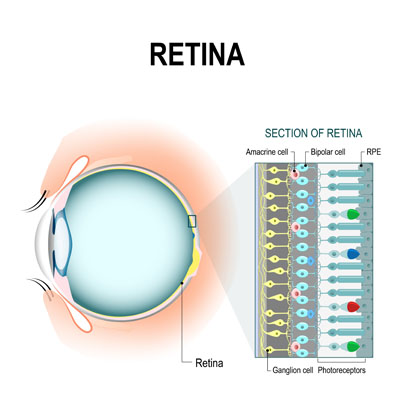
Our ophthalmology office is available for any retinal issues.
Your retina is at the back of your eye and receives light that passes through your lens. It's responsible for converting that light into readable signals for your brain. Unfortunately, if you have a retinal issue, you may experience floaters, blurred or distorted vision, or even a loss of vision. Fortunately, the ophthalmologists at Avery Eye Clinic can diagnose and treat problems with your retina.
General Information About Retinal Issues Test
Issues with your retina may affect your side vision and cause visual disturbances. For some individuals, a significant amount of vision loss is possible.
The problem may stem from a tear in your retina. When this occurs, the vitreous – a gel-like substance – shrinks. It tugs on the tissue in your retina and can damage it.
Your retina may detach. When the retina lifts away from the underlying tissue, you may experience tunnel vision and visual disturbances. Unfortunately, if you don't receive treatment soon enough, you could have permanent vision loss.
Other possible issues with your retina include the following:
- Macular degeneration
- Macular hole
- Epiretinal membrane
- Diabetic retinopathy
- Retinitis pigmentosa
What to Expect During Your Appointment for Retinal Issues
The first part of the exam consists of your ophthalmologist asking you to complete a full medical history report, which inquires about any eye problems or other health problems you have. Then, you'll undergo a dilated examination. Your doctor will ask about any recent eye problems you've had.
Your ophthalmologist will perform a slit-lamp exam, which utilizes light and a low-powered microscope. Your doctor examines the inside of your eye to look for any signs of tears, detachment, or other issues with your retina.
Further testing may be necessary to determine the location and extent of the disease. For instance, your ophthalmologist may use an Amsler grid to asses your peripheral vision. You'll need to identify if any of the lines on the grid appear distorted, broken, or faded.
An optical coherence tomography (OCT) test may be used to capture an image of your retina. This particular test looks for holes and swelling in your macula.
Your ophthalmologist might use any of the following to further assess your retina:
- Fluorescein angiography (FA)
- Fundus autofluorescence (FAF)
- Indocyanine green angiography (ICG)
- Ultrasound
Treatment for Retinal Issues
The main goals of treatment are to stop or slow the progression of the disease and to preserve, and improve your vision. In many cases, damage that has already occurred can't be reversed, making early detection important. Your ophthalmologist will work with you to determine the best treatment, or may refer you to a retinal surgeon, depending on your issue.
Treatment of retinal disease may be complex and sometimes urgent, but many conditions are manageable, especially when you seek out immediate medical attention.
For more information about retinal issues, contact Avery Eye Clinic at (936) 539-4500.
